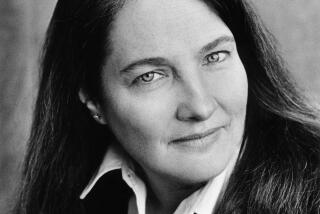Look! Up in the sky ... It’s Al Gore!
- Share via
WHEN MY daughter Sarah was in utero, all we knew of her was a sonogram that we brought home from the gynecologist. I framed that photo and labeled it with the name “Jor-El.” In our family, we generally name our kids after deceased relatives whom we want to honor. Jor-El seemed a good candidate.
At the time, I was writing Superman comics, and Sarah’s onetime namesake, you will recall, is Superman’s Kryptonian father, an eminent scientist whom the ruling “Science Council” of his world laughed out of the room when he told them that they were facing a planetary crisis: “Gentlemen, Krypton is doomed.”
I have often thought that doctors and scientists, trained to concern themselves with truth and human values, would be more suitable candidates to set public policy than those schooled in law, economics and management who commonly populate our public servants’ talent pool.
But on Krypton, either the essential nature of scientists diverged from that of the open-minded and collaborative types with whom we are familiar here on Earth, or generations of “scientific” rule had befouled the Kryptonian leaders to the degree that they became as shortsighted and starchy as those who traditionally administer our own public affairs.
Like the Science Council, our leaders reacted with guffaws when one of our own rose to sound an earthshaking alarm. As a professional fabulist, by contrast, my reaction to Al Gore’s 1992 book, “Earth in the Balance,” was one of enormous excitement. It had pathos and drama, and extraordinary ideas expressed clearly and simply: a proposal for a new paradigm for the relationship between humanity and the planet.
Now comes “An Inconvenient Truth,” with Al Gore as Jor-El. Fire up the popcorn.
What excites me the most about Gore’s warnings are that they make my own dire fantasies a little bit more respectable. I write about characters who concern themselves with capping volcanic eruptions and redressing injustice in dramatic fashion, and obstructing the people who bring about these evils for their scheming self-interest. And so does the former vice president, who calls for a massive international effort around a central organizing principle in order to save the world.
Fiction, when it’s any good, is a fantasy that tells the truth. Given the characters and degrees of suspension of disbelief with which you seed your story, you have to be internally consistent. A hero, for example, cannot choose as a matter of preference to let a bad guy get away with murder -- or theft, or extortion, or environmental exploitation. And a group of characters established as a stodgy, priggish oligarchy of entrenched rulers cannot choose to accede to the warnings of an upstart -- a rival, really -- who makes a case, no matter how compelling, for an extensive and costly solution to a pressing problem. More likely, the rulers would deny that the problem exists.
I didn’t create Jor-El, or his conundrum. A guy named Jerry Siegel did that a decade before I was born. I just retold his story in my own words, as many storytellers have done before and since. Jerry’s story was archetypal, recurring in virtually every major culture that has lasted long enough to grow stories. We tale-spinners are voices calling out into the vacuum, reminding those of lesser imaginations of the fact that worlds do end, that heroes are required. For Sarah’s sake, I hope this world lasts long enough that Gore’s story gets added to the pantheon.
More to Read
Sign up for our Book Club newsletter
Get the latest news, events and more from the Los Angeles Times Book Club, and help us get L.A. reading and talking.
You may occasionally receive promotional content from the Los Angeles Times.










